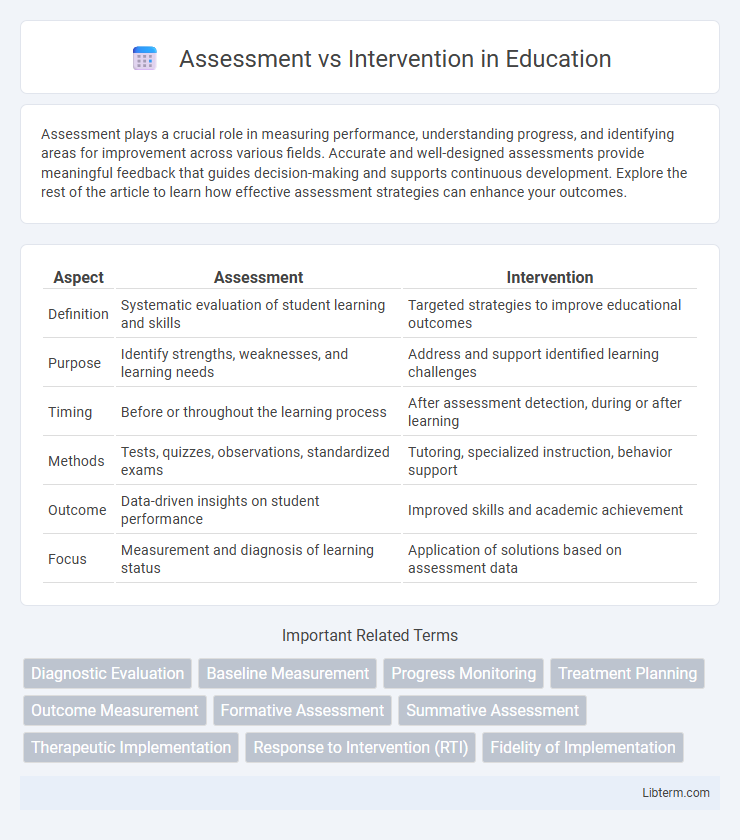Assessment plays a crucial role in measuring performance, understanding progress, and identifying areas for improvement across various fields. Accurate and well-designed assessments provide meaningful feedback that guides decision-making and supports continuous development. Explore the rest of the article to learn how effective assessment strategies can enhance your outcomes.
Table of Comparison
| Aspect | Assessment | Intervention |
|---|---|---|
| Definition | Systematic evaluation of student learning and skills | Targeted strategies to improve educational outcomes |
| Purpose | Identify strengths, weaknesses, and learning needs | Address and support identified learning challenges |
| Timing | Before or throughout the learning process | After assessment detection, during or after learning |
| Methods | Tests, quizzes, observations, standardized exams | Tutoring, specialized instruction, behavior support |
| Outcome | Data-driven insights on student performance | Improved skills and academic achievement |
| Focus | Measurement and diagnosis of learning status | Application of solutions based on assessment data |
Understanding Assessment and Intervention
Understanding assessment involves systematically gathering, analyzing, and interpreting data to evaluate an individual's skills, behaviors, or needs. Intervention refers to targeted strategies or actions designed to address identified challenges or enhance development based on assessment results. Effective practice integrates precise assessment to inform intervention planning, ensuring tailored support and measurable outcomes.
Key Differences Between Assessment and Intervention
Assessment involves the systematic collection and analysis of data to identify an individual's strengths, weaknesses, and needs, serving as the foundation for informed decision-making. Intervention refers to the targeted strategies and actions implemented to address specific deficits or challenges identified during the assessment process. Key differences include assessment's diagnostic purpose versus intervention's remedial focus, with assessment providing evaluation and measurement, while intervention emphasizes treatment and skill development.
Importance of Assessment in Practice
Assessment serves as the foundation for effective intervention by providing critical data on a patient's current condition, strengths, and areas of need, enabling tailored treatment plans. Accurate assessment tools and techniques facilitate early detection of issues, improve diagnostic accuracy, and track progress over time, ensuring interventions remain relevant and effective. Integrating comprehensive assessment into clinical practice enhances decision-making, optimizes resource allocation, and maximizes patient outcomes in diverse healthcare settings.
The Role of Intervention in Achieving Outcomes
Intervention plays a critical role in achieving desired outcomes by directly addressing identified needs and challenges highlighted during assessment phases. Effective interventions are designed to target specific goals, enhance skill development, and promote behavioral or cognitive changes that lead to measurable improvements. Continuous monitoring and adjustment of interventions ensure alignment with individual progress and optimize the overall success of treatment plans.
When Should Assessment Occur?
Assessment should occur at the initial stage of identifying a client's needs to establish baseline data and inform targeted intervention strategies. Ongoing assessments are crucial throughout the intervention process to monitor progress and adjust approaches based on real-time feedback. Post-intervention assessments evaluate the effectiveness of treatment and guide future care planning.
Timing and Phases of Intervention
Assessment establishes a baseline by identifying specific needs, challenges, and strengths prior to intervention, ensuring targeted and effective planning. Intervention timing varies across phases: immediate, short-term, and long-term, each designed to address evolving goals and measure progress systematically. Continuous assessment throughout intervention phases allows for data-driven adjustments, optimizing outcomes and resource allocation.
Tools and Techniques for Effective Assessment
Effective assessment relies on tools like standardized tests, observation checklists, and structured interviews to gather accurate data on individual performance and needs. Techniques such as formative assessments, performance-based tasks, and self-assessments provide ongoing insights that guide targeted interventions. Combining quantitative instruments with qualitative methods ensures a comprehensive understanding essential for designing impactful intervention strategies.
Strategies for Successful Intervention
Effective intervention strategies rely on accurate assessment data to identify specific needs and tailor support accordingly. Utilizing evidence-based approaches such as individualized goal setting, continuous progress monitoring, and collaborative stakeholder involvement enhances the success of intervention. Integrating adaptive techniques and timely adjustments based on assessment results ensures interventions remain responsive and impactful.
Integrating Assessment and Intervention
Integrating assessment and intervention creates a dynamic feedback loop where real-time data informs tailored strategies, enhancing the effectiveness of educational and clinical practices. This approach emphasizes continuous monitoring and adjustment, ensuring interventions are responsive to individual progress and needs. Effective integration leverages tools such as formative assessments and evidence-based interventions to optimize outcomes and promote sustained development.
Challenges and Best Practices in Assessment vs Intervention
Challenges in assessment include bias, inaccurate data collection, and misinterpretation of results, which can lead to ineffective interventions. Best practices involve using standardized tools, continuous monitoring, and involving multidisciplinary teams to ensure accurate diagnosis and personalized intervention plans. Effective interventions rely on clear assessment outcomes, ongoing evaluation, and adaptability to individual needs for optimal results.
Assessment Infographic

 libterm.com
libterm.com